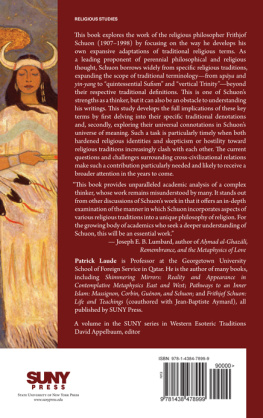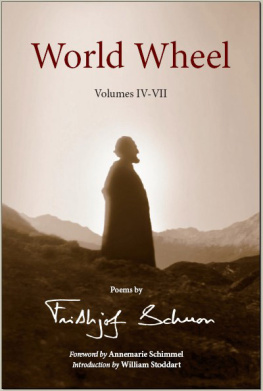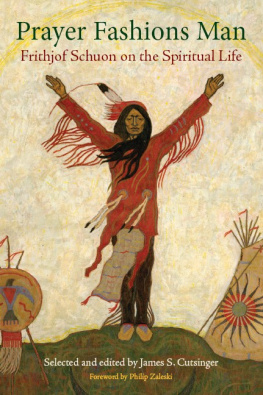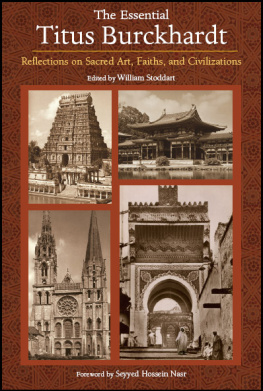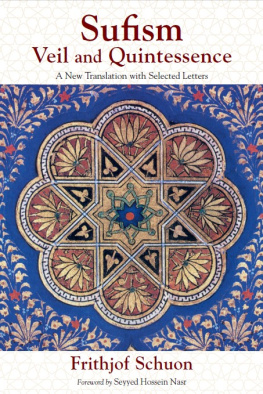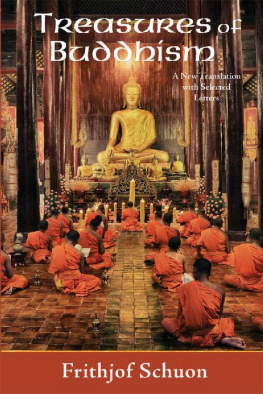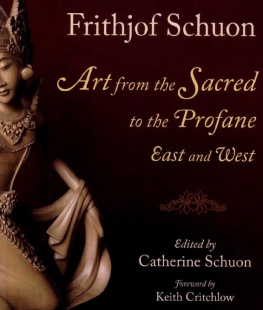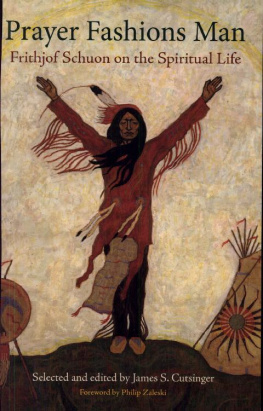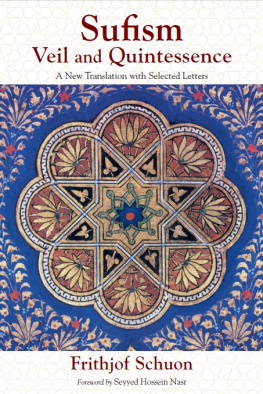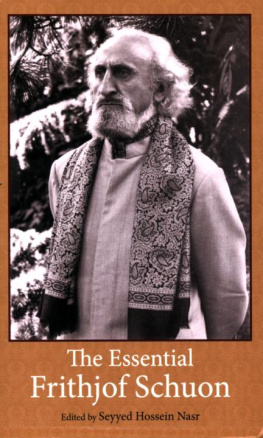KEYS TO THE BEYOND
SUNY series in Western Esoteric Traditions
David Appelbaum, editor
KEYS TO THE BEYOND
Frithjof Schuons Cross-Traditional Language of Transcendence
PATRICK LAUDE
Cover: Apparition of the Buffalo Calf Maiden (1959). This painting by Frithjof Schuon represents the coming of the holy Pte San Win, White-Buffalo-Calf-Woman, to the Lakota people, bringing to them the sacred pipe. The original painting is 10 by 24 inches. Schuon Estate.
Published by State University of New York Press, Albany
2020 State University of New York
All rights reserved
Printed in the United States of America
No part of this book may be used or reproduced in any manner whatsoever without written permission. No part of this book may be stored in a retrieval system or transmitted in any form or by any means including electronic, electrostatic, magnetic tape, mechanical, photocopying, recording, or otherwise without the prior permission in writing of the publisher.
For information, contact State University of New York Press, Albany, NY
www.sunypress.edu
Library of Congress Cataloging-in-Publication Data
Names: Laude, Patrick, 1958 author.
Title: Keys to the beyond : Frithjof Schuons cross-traditional language of transcendence / Patrick Laude.
Description: Albany : State University of New York, 2020. | Series: SUNY series in Western esoteric traditions | Includes bibliographical references and index.
Identifiers: LCCN 2019055788 (print) | LCCN 2019055789 (ebook) | ISBN 9781438478999 (hardcover : alk. paper) | ISBN 9781438479002 (ebook)
Subjects: LCSH: Absolute, The. | Schuon, Frithjof, 19071998Criticism and interpretation. | Metaphysics. | Spiritual life. | ReligionPhilosophy.
Classification: LCC BD416 .L38 2020 (print) | LCC BD416 (ebook) | DDC 200.92dc23
LC record available at https://lccn.loc.gov/2019055788
LC ebook record available at https://lccn.loc.gov/2019055789
10 9 8 7 6 5 4 3 2 1
In Memoriam Sharlyn Romaine
These days I have made a painting showing the White Buffalo Calf Woman bringing the Pipe to the Indians. One may wonder why I made this painting, or others, and why I have been so involved with American Indians () () These paintings and their contents are obviously explained by my position at the crossroads of traditional worlds, and this position itself is explained by the cyclic moment in which we live.
Frithjof Schuon, letter to Martin Lings, November 20, 1958
Contents
Acknowledgments
My deep gratitude goes to John Paraskevopoulos and Harry Oldmeadow for their thorough reading of the manuscript.
I am also thankful to Andr Gomez, Jean-Pierre Lafouge and Reza Shah-Kazemi for their insightful criticism and suggestions regarding several passages of this book.
My sincere thanks to Daniela Boccassini and Carlo Saccone, editors of Quaderni di Studi Indo-Mediterranei , for their permission to reproduce sections from chapter 2 that were included in Quaderni di Studi Indo-Mediterranei , vol. 10: Oikosophia: Dallintelligenza del cuore allecofilosofia, edited by Daniela Boccassini ( Mimesis , 2017): 285306.
Finally, many thanks to Michael and Joseph Fitzgerald and the Schuon Estate for kindly providing a reproduction of Frithjof Schuons painting and granting permission to reproduce it on the cover of this book.
Introduction
In his seminal book Sufism and Taoism , Toshihiko Izutsu (19141993) called for a cross-cultural meta-philosophy that might provide rigorous intellectual tools for comparative studies of Western and Eastern metaphysical traditions. Izutsu referred to Henry Corbins notion of a dialogue in meta-history to express the wish that meta-historical dialogues, conducted methodically, will eventually be crystallised into a philosophia perennis in the fullest sense of the term. This philosophia perennis would be nothing less than a conceptual synthesis of the worlds wisdom traditions that, without claiming to supersede their respective doctrinal integrity, could function as a philosophical and theological lingua franca in a globalized world. The current project takes stock of this intellectual challenge and proposes to make a contribution toward this goal. In other words, it takes the fact of intellectual globalization as a starting point and a motivating factor for the elaboration of a philosophical metalanguage, a philosophia perennis. This philosophical lingua may function as an enlightening instrument of hermeneutics and theoretical exposition, while engaging a wide spectrum of metaphysical teachings from East and West. The current questions and challenges surrounding cross-civilizational relations makes the need for such a contribution particularly compelling and one that is likely to attract broader attention.
The expression philosophia perennis can be traced back to the sixteenth century. It is found, for the first time, in the treatise De philosophia perenni (1540) by the Italian humanist Agustino Steuco. Although the term appeared during the Renaissance, the idea of a perennial wisdom that is
In the English-speaking world, the idea of a Philosophia perennis or a Sophia perennis has been popularized by the works of Aldous Huxley (18941963) and Huston Smith (19192016). There is no doubt that Huxleys The Perennial Philosophy , first published in 1945, became the best-known contribution to the idea that a core metaphysical truth lies at the heart of religions and their wisdom traditions, both Eastern and Western. Moreover, Huxleys exposition was not limited to metaphysics; it also encompassed psychology in the classical sense of a science of the soul and a corresponding ethics understood as disciplines that enabled recognition of the transcendent ground of all being. as will readily become apparent in a following chapter, The Nature of Things and the Human Margin.
Huston Smith, by contrast with Huxley, presents us with an outlook that is a direct tributary of the perennialist worldview as articulated by Gunon, Coomaraswamy, and Schuon. Smith was particularly indebted to Schuon, whom he repeatedly praised in superlative terms. This being acknowledged, it must be added that most perennialist writings do not take the de facto epistemological and cultural norms of modern mankind as their starting point. Or, if they do so, it is only by way of clearing the ground through scathing critiques of the modern Weltanschauung in their expositions of the Sophia Perennis .
As a final remark, it bears mentioning that Huston Smiths contribution is also explicitly bound up with the experiential and, indeed, experimental aspects of humanitys psycho-spiritual odyssey. This aspect of his work echoes some of Huxleys endeavors, and it is no
Although Izutsus call for a philosophia perennis originated from a sense of need, and therefore lack, there is no doubt that, when considering the development of religious metaphysics in the last five decades, important steps toward the crystallization of such a philosophia can be identified. Among other possible considerations, one cannot but be struck, in reviewing the field of comparative religion, by the still hardly recognizedat least in academiabut deeply determining influence of the philosopher of religion, Frithjof Schuon. His works have been praised as eminent expressions of the kind of philosophia perennis Izutsu was calling for. In over two dozen books written during a period of sixty years, Schuon established himself as the principal spokesman of the intellectual current sometimes referred to in English speaking countries as perennialism. Even though they are largely independent of the usual academic channels of diffusion and protocols, his works have inspired a significant number of highly positive responses among scholars in Europe, North America, and Asia. His celebrated The Transcendent Unity of Religions , first published in French in 1948 and then in English in 1953, has become a classic. This book, like Schuons other works, embraces a wide spectrum of traditional material, from Hindu and Christian concepts to Islamic and Buddhist symbols. It is proposed, therefore, that Schuons opus be given due consideration and priority when considering the possibility of a contemporary perennial philosophy.

